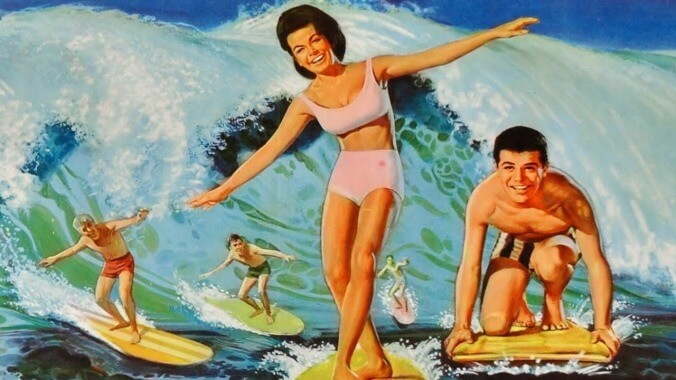Summers, as we all know, are for hula-hooping and twisting to some really boss surf rock with the gang. If you, between gulps of malted milk at the soda shoppe, ever wonder where these traditions came from, you’re in luck: The Royal Ocean Film Society has put together a video all about early ‘60s beach party movies. Watch on for a return to that bygone era when teenagers thought nothing was cooler than crew cuts, surf boards, and swinging melodies about getting to first base in their parent’s environment-destroying cars.
The clip traces the phenomenon from the breakout success of 1950s teen movies like Rebel Without a Cause and The Wild One to the run of beach-party movies put out by B-movie maestros Roger Corman, Sam Arkoff, and James Nicholson’s American International Pictures (AIP). It describes how the company’s approach—basically, cater entirely to what straight 19 year-old men might like—ended up creating a genre described as being “sold to teenagers” rather than exploring what being a teenager means.
Having found their market, AIP set up a factory line process of finding a good title, designing a poster, selling the movie based on these factors alone, and then getting around to writing it after the fact. “You put together a comedy filled with popular music, romance, a celebrity cameo, and you center it all around a marketable trend,” the clip explains. Thus, a story about burgeoning American surf culture was mixed with “teen escapism taken to an overwhelmingly ridiculous level” in 1963's Beach Party. The result was the birth of a genre made up of campy comedies with dumb adults, fun-loving teens, nefarious biker gangs, and an anything-goes tone purposely designed to ignore the real social problems faced by contemporary youth.
After Beach Party’s success, AIP pumped out numerous cookie-cutter follow-ups. Other studios, hoping to catch their lucrative wave, did the same until 1967, when the saturated market (the video counts “30-plus [beach party] films in less than five years”) collapsed and teens started watching movies about car racing for a few years instead. The Royal Ocean Film Society points out that this shift in how Hollywood markets movies to teenagers, more than anything else about the genre itself, is what makes beach movies so important to film history.
Personally, that sounds like something only a grown-up would say. Who needs all this talk about business when there’s waves to catch? It’s the early ‘60s, we’re teenagers, and we’re never gonna get old and do anything to the global economy!
Send Great Job, Internet tips to [email protected]













![HBO teases new Euphoria, Larry David, and much more in 2026 sizzle reel [Updated]](https://img.pastemagazine.com/wp-content/avuploads/2025/12/12100344/MixCollage-12-Dec-2025-09-56-AM-9137.jpg)



























